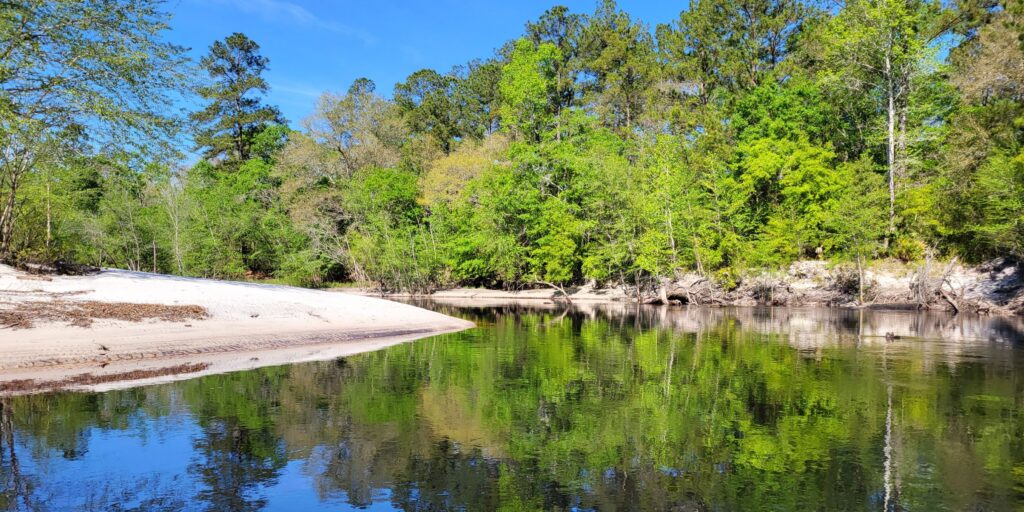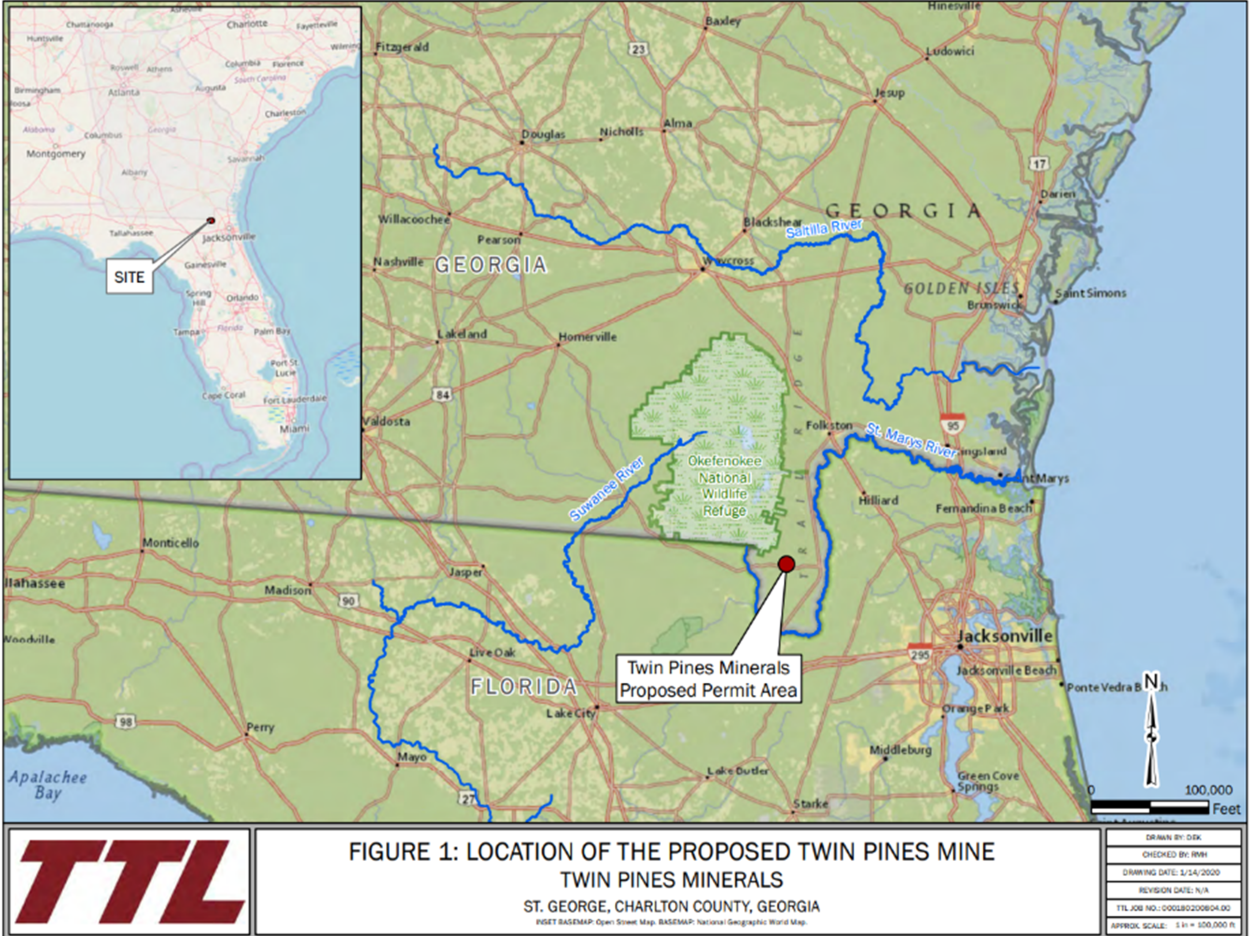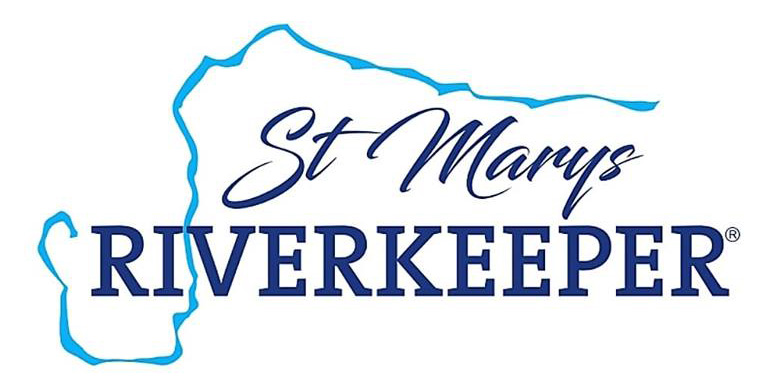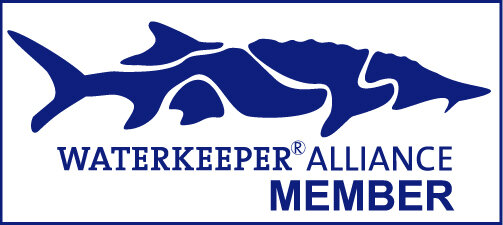
Formal Comments Submitted
April 9, 2024
St. Marys Riverkeeper submitted formal comments to Georgia Environmental Protection Division regarding the draft permits for groundwater and surface mining for Twin Pines Mineral’s Saunders Demonstration mine in Charlton County.
What did we say?
St. Marys Riverkeeper urged the Georgia Environmental Protection Division (EPD) to deny permits to mine on Trail Ridge adjacent to the St. Marys River and Okefenokee Swamp.
Riverkeeper’s objection to the issuance of these permits focuses on significant risk of failure and the use of several experimental and untested techniques for sand mining in this area. Also, there is a bigger risk should catastrophic events occur causing unprecedented failure. The St. Marys River is Georgia’s best kept secret, and it supports the local community through fishing and tourism opportunities. The St. Marys River and Okefenokee Swamp are too important to risk with untested mining methods from a company that does not have experience in greenfield mining and has a negative track record of environmental stewardship.
There is insufficient plan detail and performance criteria in the proposed EPD permits to provide reasonable assurances that the construction and operation of the mine will not have short-term and lasting water quantity and water quality impacts on the St Marys River, in particular the impacts to the critical habitat for the federally endangered Atlantic Sturgeon. Riverkeeper added additional comments and questions regarding EPD’s communications with the state of Florida and Department of Defense regarding impacts to the St. Marys River that may threaten military readiness and violate Florida water quality standards.
After the public comment period, EPD will consider all public comments and may request the mining company to make changes to their proposed demonstration mine to address those comments. EPD will post responses to substantive comments on the EPD website after the official comment period closes.

On February 9, 2024, Georgia’s Environmental Protection Division (EPD) issued DRAFT air, water and surface mining permits to Twin Pines Minerals, LLC to operate an 820-acre mine within three miles of the Okefenokee National Wildlife Refuge and five miles to the St. Marys River. Citizens concerned about the future of our St. Marys River and Okefenokee Swamp have until April 9 (60 days) to voice their belief that this mine will harm our blackwater systems and that these permits should not be issued. EPD is also hosting a virtual public hearing on March 5 at 6:00p.
Written public comments can be submitted to [email protected].
The permits can be reviewed HERE.
In April 2023, St. Marys Riverkeeper hosted 5 EPD representatives to discuss impacts on the St. Marys River by taking them on a tour of the upper river by vehicle and by boat. We are currently working with them to study the endangered Atlantic Sturgeon in the river along with our partners from NOAA Fisheries and US Fish and Wildlife Service. You can read EPD’s memos regarding additional assessment of potential impacts from mining operation on the St. Marys River HERE.
St. Marys Riverkeeper joined over 78,000 concerned citizens and groups in opposing Twin Pines Minerals’ Mining Land Use Plan (MLUP) when it was opened up for a 60-day public comment period in early 2023. Many of our comments were included in the updated MLUP although some of our questions have gone unanswered.
PRESS RELEASE – St. Marys Riverkeeper Opposes Mining Permit
Read our MLUP PUBLIC COMMENT and watch our Lunch and Learn webinar series ‘For Our River‘ to learn more about the potential impacts this mining project may have on our St. Marys River Watershed.
Twin Pines Minerals is an Alabama-based company looking to mine along Trail Ridge, at the headwaters for River Styx (flows to the Okefenokee Swamp) and Boone Creek (flows to the St. Marys River). Mining along Trail Ridge could compromise the habitat the Swamp and the St. Marys River offers to endangered species like the Red-Cockaded Woodpecker, Wood Storks, Eastern Indigo Snakes, and the Atlantic Sturgeon.
A new federal regulation called the Navigable Waters Protection Rule went into effect June 22, 2020. The rule changed the way wetlands are defined in the Clean Water Act so that federal permits and environmental impact statements will no longer be needed before building near certain waterways. The U.S. Army Corps of Engineers ruled that because of this change, it lacked jurisdiction over 376 acres of land within the proposed mining site, so Twin Pines can proceed if the Georgia Environmental Protection Division approves five permits.
Parts of the refuge’s Trail Ridge are rich in titanium and other heavy minerals. In the past, attempts to mine there have failed due to concerns about the Okefenokee. Titanium is a strong, lightweight mineral used to build everything from missiles and jet planes to orthopedics and consumer electronics. The Georgia mine will use the titanium to make pigments that whiten cosmetics, paint and other consumer products.
In the News
- Hatch Magazine: St. Marys Riverkeeper worries about Sturgeon Habitat Feb 2024
- GA Recorder: Mining Opponents speak out Feb 2024
- GA Recorder: Draft Permits Issued Feb 2024
- AJC: Swamp Faces Threats Again by Gingrich Feb 2024
- GPB News: Mining Company Fined for Exploratory Work Jan 2024
- The Current: Okefenokee Peat and Climate Change May 2023
- Georgia Recorder: Country's Most Endangered River April 2023
- GA Recorder: Lawmakers attempt sinks April 2023
- The Guardian: "Why mine so close?" April 2023
- The Current (Coastal GA): Glynn testing April 2023
- Macon Telegraph: Climate Reporter March 2023
- Letter from USFWS to GA EPD re: Twin Pines March 2023
- Atlanta Magazine: Still Water Runs Deep March 2023
- Fernandina News Leader: Proposed Mine Hits Home March 2023
- West Nassau: Riverkeeper Opposes Mine by Emily Floore March 2023
- Atlanta Constitution: Fed scientists id critical shortcoming in mine March 2023
- Fernandina Observer: Why a mine in GA is our problem by Emily Floore March 2023
- Florida Politics: Riverkeeper bring Okefenokee debate to Nassau County March 2023
- Camden Tribune: Riverkeeper "RIver Tour" March 2023
- Outdoor Life: Featuring SMRK March 2023
- Sierra Club: Environmentalists Push to Protect the Okefenokee Swamp Feb. 2023
- NY Times: The Fate of the Okefenokee Swamp Feb. 2023
- Atlanta Constitution: Residents, Scientists Slam Mining Proposal Feb. 2023
- AP: Georgia Lawmakers propose to block mining Jan. 2023
- Ga Recorder: Okefenokee Tug-of-War Long from Over Jan. 2023



